What are Panel Meters
Panel meters are essential instruments that display information about electrical quantities in an easily readable format. These devices are vital for monitoring and controlling electrical processes, ensuring systems function within specified limits. They are commonly found in various sectors such as manufacturing, energy, automotive, and many industrial applications where precise electrical measurements are crucial.
The primary function of panel meters is to provide real-time data about the electrical system they are connected to. This can include voltage, current, resistance, frequency, and other vital parameters. Operators and engineers rely on the accuracy of panel meters to make informed decisions regarding the operation and maintenance of equipment. For instance, in a power plant, panel meters might be used to continuously monitor the output of generators to ensure they are operating efficiently and safely.
Panel meters work on different principles depending on their type. Analog meters use a moving pointer over a scale to represent the quantity being measured. They operate on the principle of electromagnetic deflection where current flowing through a coil generates a magnetic field that interacts with a permanent magnet to cause the pointer to move. Digital meters, on the other hand, use electronic components to convert the analog signals into digital data which is then displayed numerically. Digital meters offer higher precision and can often handle a wider range of measurements compared to their analog counterparts.
Individuals or businesses dealing with electricity in any capacity can benefit from using panel meters. They provide critical insights into how electrical systems are performing, which is indispensable for maintaining safety standards and operational efficiency.
Types of Panel Meters
Panel meters come in various forms to suit different applications and preferences:
Analog Panel Meters: These are traditional devices featuring a simple needle display over a calibrated scale. They are often preferred for their quick visual feedback and simplicity. Commonly used in educational settings for demonstration purposes or in industries where digital electronics might be prone to interference.
Digital Panel Meters: Offering precision and the ability to handle complex measurements, digital panel meters display readings numerically. They're widely used across various industries due to their versatility and the ability to interface with other digital systems.
LCD Panel Meters: Incorporating liquid crystal displays, these meters offer clear visibility under various lighting conditions. LCD panel meters can display readings in digital format or mimic an analog dial; some even provide graphical representations of data trends.
Different colors like black, red, or green may be chosen for display backlights to suit visibility requirements or aesthetic preferences. Panel meters come designed for single-phase or three-phase systems, ensuring compatibility with residential or industrial power systems respectively.
Materials such as ABS plastic or steel are used for meter casings based on durability needs or environmental factors like exposure to chemicals or physical impact. The application of panel meters ranges widely from retail store checkout counters displaying prices, subway systems monitoring electrical flows, exhibition halls for informational displays, to industrial settings where precise measurement is critical for process control.
Customized support such as ODM (Original Design Manufacturer) and OEM (Original Equipment Manufacturer) services cater to businesses seeking tailored solutions for their specific applications or branding requirements.
How to choose Panel Meters
Choosing the right panel meter requires consideration of several factors. First, identify the type - analog or digital - that best suits your application needs. Analog meters might be preferable for environments where simplicity and immediate visual feedback are important, whereas digital meters offer higher accuracy and can be more suitable for complex measurements.
Consider what phase compatibility you need; single-phase meters are typically sufficient for residential or light commercial applications, while three-phase meters are necessary for industrial environments where heavy machinery is operated.
The material of the panel meter should be selected based on the operating environment; ABS plastic can be suitable for indoor use while steel or stainless steel would be better options for harsher conditions where durability is paramount.
The intended use also plays a role in selection; whether it's for a retail store display or an industrial manufacturing plant will dictate the level of sophistication required in terms of functionality and connectivity options such as data logging or remote monitoring capabilities.
Customization options like ODM and OEM support should be considered if there's a need for personalized branding or specialized functionality that standard products do not offer.
Businesses should also consider supplier types - opting for original manufacturers may ensure better after-sales support and assurance of quality.
Best Panel Meters on Alibaba.com
When sourcing panel meters for business operations, Alibaba.com stands as an invaluable resource with its vast array of options provided by suppliers around the globe. Alibaba.com enables businesses of all sizes to find precisely what they need thanks to its expansive selection which caters to various industrial requirements without compromise on quality or functionality.
Alibaba.com offers an intuitive platform that simplifies the procurement process from selection through delivery. Buyers can conveniently compare specifications across different products, read reviews from other businesses, and communicate with suppliers directly to ensure they get exactly what they require – whether it's an off-the-shelf meter or a customized solution tailored to their specific needs.
Moreover, Alibaba.com's Trade Assurance service provides buyers with peace of mind by safeguarding payments until orders are fulfilled satisfactorily. With tools that facilitate mobile purchases and support multiple languages, Alibaba.com is not just a marketplace but a partner dedicated to empowering businesses globally with reliable trading solutions.
Common FAQs for Panel Meters
What are the main types of panel meters available for industrial use?
Panel meters for industrial use primarily include analog, digital, and LCD panel meters, each offering different visual displays and functionalities suitable for various applications.
How do I choose between an analog and a digital panel meter?
The choice between an analog and a digital panel meter depends on the application's need for accuracy, readability, and the type of data measurement required. Analog meters offer quick visual feedback, whereas digital meters provide higher precision and are better suited for complex measurements.
What does the phase specification mean in panel meters?
The phase specification in panel meters refers to whether the meter is designed to work with single-phase or three-phase electrical systems, which is an important consideration depending on the electrical infrastructure it will be monitoring.
Can I find panel meters suitable for outdoor use on Alibaba.com?
Yes, you can find panel meters with casings made from durable materials like steel or stainless steel that are designed to withstand outdoor conditions.
Are there customizable panel meter options available for specific business needs?
Many suppliers on Alibaba.com offer ODM and OEM support, allowing businesses to receive customized panel meter solutions tailored to their specific needs and branding requirements.
How can I ensure that the panel meter I choose will be accurate and reliable?
Choosing a panel meter from a reputable original manufacturer or supplier on Alibaba.com can help ensure accuracy and reliability. Additionally, looking at product specifications and reviews may provide insights into the quality of the products.
What are some common applications for LCD panel meters?
LCD panel meters are versatile and can be used in a variety of settings including retail stores, subway systems, exhibition halls, and industrial environments where clear visibility under different lighting conditions is necessary.
Do panel meters come with features for remote monitoring or data logging?
Some digital panel meters come equipped with advanced features like remote monitoring or data logging capabilities. It's important to review the product specifications or inquire directly with suppliers to determine if these features are available.
Is it possible to source multi-function panel meters that measure various electrical quantities?
Yes, multi-function panel meters are available and capable of measuring multiple electrical quantities such as voltage, current, power, frequency, and more. These are especially useful in complex industrial systems where multiple readings are required from a single device.
How does color play a role in selecting a panel meter?
Color options typically pertain to backlight colors in digital or LCD panel meters which can enhance visibility or match specific aesthetic preferences. Different colors may also be used to signify different functions or measurements.
What should I consider when selecting the material for a panel meter's casing?
When selecting the material for a panel meter's casing, consider factors like environmental exposure, potential chemical interactions, impact resistance, and overall durability requirements of the application.
How do I know if a supplier on Alibaba.com is an original manufacturer?
Supplier profiles on Alibaba.com often indicate whether they are original manufacturers. You can also engage in direct communication with suppliers to confirm their manufacturing capabilities and status.





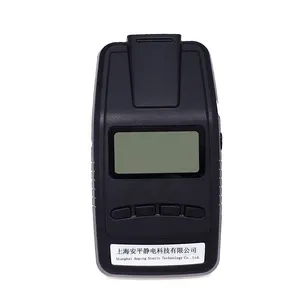






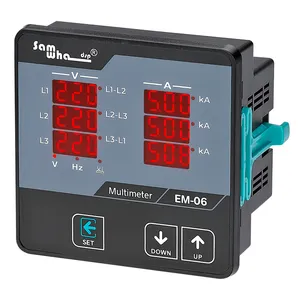
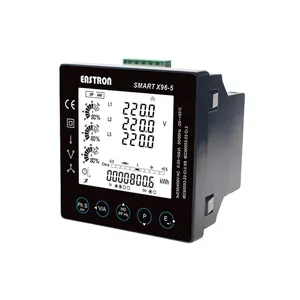







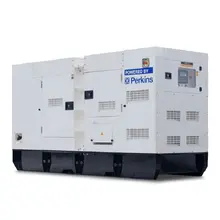

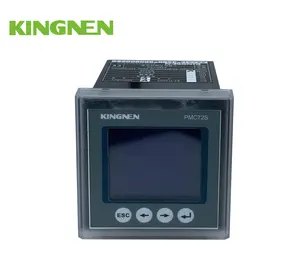




















 浙公网安备 33010002000092号
浙公网安备 33010002000092号 浙B2-20120091-4
浙B2-20120091-4